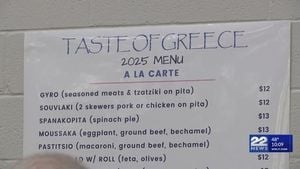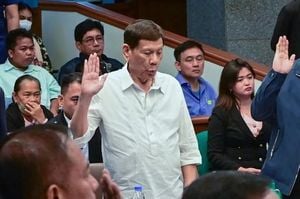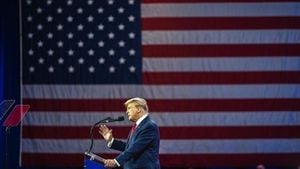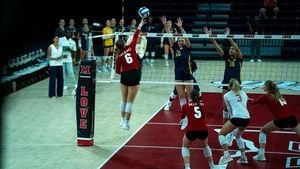South Korea is on the brink of early presidential elections, fueled by the spectacular legal woes surrounding incumbent President Yoon Suk-yeol, who faces multiple allegations of wrongdoing. Recent polling reveals competitive matchups among potential candidates, indicating not only shifting public sentiments but also the severity of political polarization currently at play.
A poll released by Dailyan highlights the narrow margins separating key candidates. If Lee Jae-myung from the Democratic Party were to challenge Kim Moon-soo, the Minister of Employment and Labor, the poll shows Lee garnering 41.5% support compared to Kim's 38.3%; this translates to merely 3.2 percentage points within the margin of error. A considerable portion of respondents—15.6%—did not back any candidate, indicating potential voter apathy or indecision.
Further analysis from 시사저널 indicates Kim's support outscores Lee's slightly, with Kim at 46.4% against Lee’s 41.8% when asked whom they would support between the two, reflecting the growing momentum within the conservative voter base as they rally around Kim during Yoon's tumultuous presidency. This shift marks the first time since the December 3rd emergency measures, implying the vulnerability of the Democratic Party's formerly stronghold positions.
Interestingly, Yoon's own approval ratings are precariously balanced, with 48.8% of polled citizens indicating their support, and 49.6% disapproving of his presidency. This near split denotes high dissatisfaction, correlatively reflected within the public sentiment surrounding both prominent candidates where respondents were asked, “Who is less likable, Lee or Yoon?” with 45.5% favoring Yoon, and 42.8% siding with Lee.
The rivalry doesn’t end there, as the polling results reveal fluctuations when paired against other potential candidates. Lee faces equally tight matches with other figures, like O Se-hoon, the Mayor of Seoul, who trails Lee closely by 41.7% to 35.6%, highlighting how generic preferences differ at various levels of the political spectrum.
Zooming out of these individual matchups, the broader party dynamics reveal the ruling party, the People Power Party, obtaining 45.9% support, casting the Democratic Party’s 36.7% distinctly behind. This discrepancy accentuates how entrenched loyalties are being tested as the electoral climate evolves with each poll.
Generational perspectives greatly affect the data. While younger voters between ages 18-29 tend to prefer Lee (43.1%), sentiments shift dramatically among older demographics. For example, the 30s and above exhibit greater support for Kim, with discernible divides widening the gap between candidates.
The polling data not only crystalizes key rivalries heading to elections but reflects the overarching tides within South Korea’s political arena. The traditional stronghold the Democratic Party enjoyed may be waning, particularly under the backdrop of Yoon's mounting pressures, as seen through these combative electoral matchups.
On the multi-candidate front, Lee's favorability still leads with 33.2% indicating he is still viewed as the most suitable candidate for the presidency when up against multiple challengers, including Kim Moon-soo, who clocks at 19.1%. This reflects Lee's perceived viability, even when faced with the looming figure of Kim.
To conclude, as South Korea grapples with the ramifications of President Yoon's administration and its legal tussles, the fight for the next presidency appears to be finely balanced. With recent poll results spotlighting not just the candidates’ likability but also the intrinsic party loyalties and voter demographics, the political atmosphere is heating up. Many observers will be watching closely as elections approach, assessing how these rapidly shifting dynamics will shape the nation's leadership for years to come.



